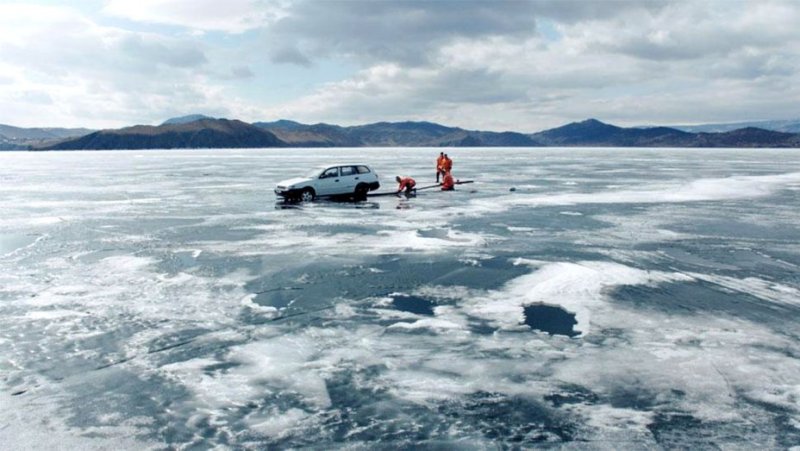
AQUARELA
Sony Pictures Classics
Reviewed for Shockya.com & BigAppleReviews.net linked from Rotten Tomatoes by: Harvey Karten
Director: Victor Kossakovsky
Screened at: Sony, NYC, 7/15/19
Opens: August 16, 2019
Day after day, day after day,
We stuck, nor breath nor motion;
As idle as a painted ship
Upon a painted ocean.
Unless you were distracted by your iPhone in English lit. class that day, you recognize these lines from Samuel Taylor Coleridge’s “The Ancient Mariner.” The title character, who tells his stories to all who are forced to listen, relates how he shot an albatross resulting in the loss of the south wind and the forced stall of his ship. The Mariner fought against nature, and nature fought back in revenge. Nature is on display with a vengeance in Victor Kossakovsky’s “Aquarela,” the kind of picture you’ve never quite seen before and should embrace if you believe that there is no originality in movies these days. Kossakovsky, or if you prefer ?????? ????????????? ???????????, is the Leningrad-born director of “Vivan las antipodas,” in which he contrasts an area of Argentina with its antipode, metropolitan Shanghai, and now continues experimenting with cinema. This time he has hired water as the principal character (though a few mortal beings are shown), and, technologically filming at 96 frames per second to watch speedily disintegrating icebergs for us.
The thing about “Aquarela” is that what is shown here is the opposite of what the Ancient Mariner experiences. In place of a stagnant body of water, we see water, water, everywhere, the substance that covers most of our planet, in furious motion. He takes his camera to Russia’s Lake Baikal, then on to Greenland (always used by school teachers to show the distortions of a flat, Mercator map that impresses you with an island that seems larger than the U.S.), then to Angel Falls in Venezuela and finally to our own Miami. In each case Mr. or Ms. Water offer us quite a show, no charge beyond the movie’s price and no need to travel the world to experience the raging forces of nature.
The director could have used the opportunity to propagandize in favor of arguments of the 99.5% of scientists who warn of climate change but instead allows us in the audience to infer what seems obvious to anyone who is not mentally retarded. There is high drama in Lake Baikal as auto drivers, assuming that the ice would not melt for another three weeks, drive across the solid foundation only to sink when the ice gives way. We actually witness a poor guy who is photographed making the fatal move and commiserate with one of the workers who are fishing out a car when he sobs that his friend has died.
When he heads to Greenland—a place that I always wanted to visit if only to get a T-shirt with its logo—Kossakovsky affords us a look of drama that has nothing to do with human beings. Icebergs turn upside down, reminding us that icebergs are 90 percent below water and tippable. We hardly need the heavy metal in the soundtrack given the melodrama going on in the water, the publicity notes explaining that we hear a “symphony of rushing, thundering, crashing, trickling, popping and cracking.” If you teach English, use this as your prime example of onomatopoeia.
Thanks to mismanagement by the socialist government of Venezuela there are virtually no U.S. tourists in that country, but never mind. Kossakovsky is there showing the country’s principal tourist attraction, Angel Falls, without special effects, a rainbow serving to belie the political and economic realities of that formerly prosperous destination. Later, an American flag! We’re in Miami’s South Beach during hurricane Irma and no, the camera people, Ben Bernhard and the director, are not hiding inside the Hilton Hotel but right out there in the middle of the storm as if we have not already been convinced that nature is quite able to counteract anything that we human beings throw at it.
This is not to say that “Aquarela” is for everybody. After all it is distributed by Sony Pictures Classics, not by Columbia, and therefore is not as friendly to masses of moviegoers as are other films about devastations of nature such as “Only the Brave” (wildfires); “Earthquake” (collapsing Los Angeles); or “The Last Days of Pompeii” (volcanoes go boom). The right crowd will hopefully find it when it opens in mid-August.
90 minutes. © 2019 by Harvey Karten, Member, New York Film Critics Online
Story – B-
Acting – A
Technical – A
Overall – B+
